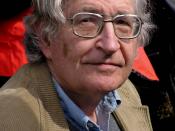The main premises of the theory:
1- Generative Transformational Grammar views language as "abstract system of rules by which a person is able to understand and produce any and all of the well formed sentences of the language".
2- Chomsky proposed that all people have an innate ability to acquire language, which he called "Language Acquisition Device (LAD)". People acquire language rapidly because they are biologically equipped to do so and possess an innate mechanism which is programmed to recognized grammatical structure. This (LAD) is not specific to a particular language, such as English or Chinese, but rather sets limits on what is permissible in any acquired language.
3- He maintained that learning a language could not occur as a result of environment exposure alone because much of what people hear spoken is "degenerate output". He also believed that language acquisition cannot be dependent upon intelligence or experience because it occurs at a time when the children incapable of complex cognitions.
4- Chomsky argued that children learn language not by habit formation but by acquisition a set of rules or grammar. This grammar will have a finite number of rules, but will be capable of generating an infinite number of well-formed sentences. Most of these sentences are new to our experience. This linguistic knowledge must have a generative capacity.
In other words, children do not learn and reproduce a large set of sentences, but they routinely create new sentences that they have never learnt before. This is only possible because they internalize rules rather than strings of words; extremely common examples of utterances, such as "it breaked" or "mummy goed" Show clearly that children are not copying the language around them but applying rules.
5- The task of the linguist, he claimed, is to describe this universal human ability,


